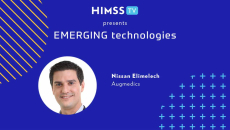Operations
The company will use the funds to invest in research and development and to scale its voice AI platform.
HIMSS25
AI tools can personalize patients' searches for providers, but Kyruus Health's Gen Conlin believes nurse informaticists' ability to ensure tool accessibility and accuracy are vital to ensuring patients find the right care.
Eversana senior vice president of health innovation, Alberta Spreafico, discusses the company's collaboration with the Digital Therapeutics Alliance to analyze frameworks and map reimbursement pathways in Europe for digital health adoption.
In response to a new price cap law in Indiana, Hal Andrews, CEO of Trilliant Health, says once a state legislature is allowed to determine maximum reimbursement, hospitals are subject to that being changed any time the legislature gets together.
HIMSS25
Edward Marx, CEO of Marx Advisory, recommends that healthcare leaders looking to drive innovation in their organizations become innovative themselves by bringing their C-suite to meet with and learn from partners.
Anne Osdoit, CEO of Moon Surgical, discusses the company’s Maestro surgical robotics system and how it supports surgeons during soft tissue procedures.
HIMSS25
From documenting bedside prayers to helping a hard-of-hearing nurse connect with patients, AI tools are revealing the importance of nurses' and patients' emotional and spiritual bonds to healing, says Mercy's Tracy Breece.
HIMSS25
According to Tony DiGiorgio, chief architect at Symplr, the company has carefully embedded AI into its operational platform to cut administrative redundancy and enable nurses to minimize the number of systems they use each day.
Nissan Elimelech, founder of Augmedics, shares how the company's augmented reality surgical technology projects an anatomically accurate 3D spine onto the patient, helping surgeons operate with their eyes on the body instead of a screen.
HIMSS25
Regina Wysocki, senior informatics program manager at Lone Star Communications, says centralizing health system data provides nurses with a "bigger picture" of operations so they can uncover trends that can improve care delivery.









